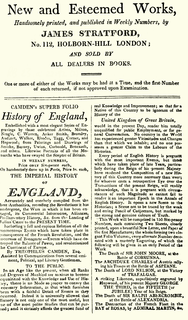
An encyclopedia, or encyclopaedia is a reference work or compendium providing summaries of knowledge either general or special to a particular field or discipline. Encyclopedias are divided into articles or entries that are arranged alphabetically by article name or by thematic categories, or else are hyperlinked and searchable by random access. Encyclopedia entries are longer and more detailed than those in most dictionaries. Generally speaking, encyclopedia articles focus on factual information concerning the subject named in the article's title; this is unlike dictionary entries, which focus on linguistic information about words, such as their etymology, meaning, pronunciation, use, and grammatical forms.

Postal history is the study of postal systems and how they operate and, or, the study of the use of postage stamps and covers and associated postal artifacts illustrating historical episodes in the development of postal systems. The term is attributed to Robson Lowe, a professional philatelist, stamp dealer and stamp auctioneer, who made the first organised study of the subject in the 1930s and described philatelists as "students of science", but postal historians as "students of humanity". More precisely, philatelists describe postal history as the study of rates, routes, markings, and means.

World of Warcraft (WoW) is a massively multiplayer online role-playing game (MMORPG) released in 2004 by Blizzard Entertainment. Set in the Warcraft fantasy universe, World of Warcraft takes place within the world of Azeroth, approximately four years after the events of the previous game in the series, Warcraft III: The Frozen Throne. The game was announced in 2001, and was released for the 10th anniversary of the Warcraft franchise on November 23, 2004. Since launch, World of Warcraft has had eight major expansion packs: The Burning Crusade (2007), Wrath of the Lich King (2008), Cataclysm (2010), Mists of Pandaria (2012), Warlords of Draenor (2014), Legion (2016), Battle for Azeroth (2018), and Shadowlands (2020), with a ninth, Dragonflight, currently in development.

The Space Interferometry Mission, or SIM, also known as SIM Lite, was a planned space telescope proposed by the U.S. National Aeronautics and Space Administration (NASA), in conjunction with contractor Northrop Grumman. One of the main goals of the mission was the hunt for Earth-sized planets orbiting in the habitable zones of nearby stars other than the Sun. SIM was postponed several times and finally cancelled in 2010. In addition to detecting extrasolar planets, SIM would have helped astronomers construct a map of the Milky Way galaxy. Other important tasks would have included collecting data to help pinpoint stellar masses for specific types of stars, assisting in the determination of the spatial distribution of dark matter in the Milky Way and in the local group of galaxies and using the gravitational microlensing effect to measure the mass of stars. The spacecraft would have used optical interferometry to accomplish these and other scientific goals.
InQuest Gamer was a monthly magazine for game reviews and news that was published from 1995 to 2007. Originally, the magazine was named InQuest and focused solely on collectible card games (CCGs); InQuest, along with its competitor Scrye, were the two major CCG magazines. Later, the magazine changed its focus to cover a wider range of games, including role-playing games, computer and video games, collectible miniature games, board games, and others. The magazine was published by Wizard Entertainment.
Game Developer, formerly known as Gamasutra, is a website founded in 1997 that focuses on aspects of video game development. It is owned and operated by Informa and acts as the online sister publication to the print magazine Game Developer.

Atomic once was a monthly Australian magazine and online community that focused on computing and technology, with a great emphasis on gaming, modding and computer hardware. Atomic was marketed at technology enthusiasts and covered topics that were not normally found in mainstream PC publications, including video card and CPU overclocking, Windows registry tweaking, and programming. The magazine's strapline was 'Maximum Power Computing', reflecting the broad nature of its technology content.
BrainPop is a group of educational websites based in New York City. It hosts over 1,000 short animated movies for students in grades K-12, together with quizzes and related materials, covering the subjects of science, social studies, English, math, engineering and technology, health, arts and music. On October 11, 2022, Kirkbi A/S, the private investment and holding company that owns a controlling stake in Lego, acquired BrainPOP.

A partwork is a written publication released as a series of planned magazine-like issues over a period of time. Issues are typically released on a weekly, fortnightly or monthly basis, and often a completed set is designed to form a reference work on a particular topic.

Uncut magazine, trademarked as UNCUT, is a monthly publication based in London. It is available across the English-speaking world, and focuses on music, but also includes film and books sections. A DVD magazine under the Uncut brand was published quarterly from 2005 to 2006. The magazine was acquired in 2019 by Singaporean music company BandLab Technologies, and has been published by NME Networks since December 2021.

Men's Vogue was a monthly men's magazine that covered fashion, design, art, culture, sports and technology. The premier issue was August 2005. On 30 October 2008 Condé Nast announced that they intended to fold the magazine into Vogue proper as a bi-annual subscriber's supplement. However, the magazine has ceased to be published since its original folding date.

Light tubes are structures that transmit or distribute natural or artificial light for the purpose of illumination and are examples of optical waveguides.

Ashlee Vance is an American business columnist and author. His biography of Elon Musk, titled Elon Musk: Tesla, SpaceX, and the Quest for a Fantastic Future, was released on May 19, 2015. He lives with his wife Melinda and their two children Bowie and Tucker.
CSA was a division of Cambridge Information Group and provider of online databases, based in Bethesda, Maryland before merging with ProQuest of Ann Arbor, Michigan in 2007. CSA hosted databases of abstracts and developed taxonomic indexing of scholarly articles. These databases were hosted on the CSA Illumina platform and were available alongside add-on products like CSA Illustrata. The company produced numerous bibliographic databases in different fields of the arts and humanities, natural and social sciences, and technology. Thus, coverage included materials science, environmental sciences and pollution management, biological sciences, aquatic sciences and fisheries, biotechnology, engineering, computer science, sociology, linguistics, and other areas.

Editorial Planeta-DeAgostini is a Spanish-Italian publisher and a subsidiary of Grupo Planeta and De Agostini specializing in collectable books, sold periodically in pieces through newsstands (partworks). It has its headquarters in Barcelona.
De Agostini Hellas commenced its operations in Greece in 1995 and it became within a very short time one of the leading publishing companies. As of 2006, De Agostini is one of the three largest, in revenue, publishing companies in Greece.
PC Ace was a partwork magazine published by Eaglemoss Publications, between 1999 and 2001. It was aimed at those aged between 10 and 14, providing information on how to operate a personal computer. Readers of the magazine were assisted in part by a cartoon mouse named Ace, who featured throughout the magazine's pages.

Cengage Group is an American educational content, technology, and services company for the higher education, K-12, professional, and library markets. It operates in more than 20 countries around the world.
Walmart Labs became part of Walmart Global Tech, the technology and business services organization within Walmart. Venky Harinarayan and Anand Rajaraman founded Kosmix in 2005. In April 2011, Walmart acquired Kosmix and formed @WalmartLabs, a research division, out of it. In 2016, Walmart combined Walmart Labs and its information systems division (ISD) into one team called Walmart Technology. In August 2020, Walmart Technology launched its new identity as Walmart Global Tech as part of a new technology and shared services organization within the world's largest retailer.

Banjo Newsletter (BNL) is a monthly magazine devoted to the 5-string banjo.













